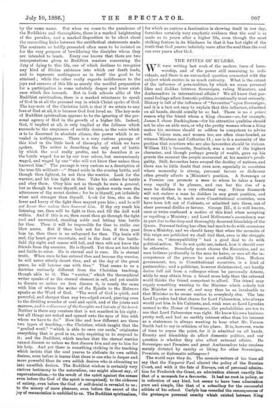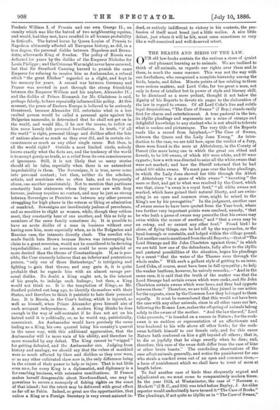THE SPITES OF RULERS.
WE were writing last week of the modern form of hero. worship, and of the power still remaining to indi- viduals, and there is an untouched question connected with the subject which excites in Us much curiosity. What is the extent of the influence of personalities, by which we mean personal likes and dislikes between Sovereigns, ruling Ministers, and Ambassadors in international affairs P We all know that per- sonal feelings affect domestic politics, occasionally most seriously. History is full of the influence of "favourites" upon Sovereigns, and it is a fact not easy to explain that this influence, admitted on all hands, should usually be so bad. There is no a priori reason why the friend whom a King chooses—as, for example, James I. chose Buckingham—for his attractive qualities should not be also an able man, or why the pretty woman whom a King makes his mistress should so seldom be competent to advise well. Vicious men, and women too, are often clear-headed, as witness Mirabe,an and Catherine II.; nor is it a necessity of the position that courtiers who are also favourites should be vicious. William 1M's favourite, Bentinck, was a man of the highest character, and though perhaps greedy of wealth, gave up his grants the moment the people murmured at his master's prodi- gality. Still, favourites have swayed the destiny of nations, and there can be little doubt that even now, especially in countries where monarchy is strong, personal favour or disfavour often greatly affects a :Minister's position. A Sovereign or a Premier can promote a man to whom he takes a fancy very rapidly if he pleases, and can bar the rise of a man he dislikes in a very effectual way. Prince Bismarck will not endure a man he dislikes in any great position, and we suspect that, in much more Constitutional countries, men have been left out of Cabinets, or admitted into them i out of sheer personal dislike or favour. George Ill., it is well known, once or twice confessed a motive of this kind when accepting or repelling a Ministry ; and Lord Melbourne's ascendency was in part due to the deep and thoroughly deserved friendship of the Queen. Personal feeling has often had much to do with secessions from a Ministry, and we should fancy that when the memoirs of this reign are published we shall find that, even in the struggle before us, " incompatibility " had a good deal to do with political action. We do not quite see, indeed, how it should ever be otherwise. Somebody must choose the Executive, and no man believes profoundly in the man he hates, or sees all the in- competence of the person he most cordially likes. Modern government, too, in Constitutional countries, is a kind of partnership; and a politician, however disinterested, can hardly derive fall aid from a colleague whom he personally detests, while he may obtain from a friend more help than the external world thinks the friend competent to afford. The friend may supply something wanting to the Minister which nobody but the Minister is aware of, and may thus be as invaluable to that Minister as be seems useless to everybody else. The late Lord Lyveden had that charm for Lord Palmerston, who always would put him in his Cabinets, and, weak man as Lord Lyveden seemed to the House of Commons, the probabilities are ten to one that Lord Palmerston was right. He knew his own business pretty well, and had no earthly interest other than his interest as a statesman in always wanting to hear what Mr. Vernon Smith had to say in criticism of his plans. It is, however, waste of time to argue the point, for it is admitted on all hands. Enmity and friendship do affect domestic politics, and our question is whether they also affect external affairs. Do Sovereigns and Premiers and great Ambassadors take resolves mainly dictated by enmity or liking for other Sovereigns, Premiers, or diplomatic colleagues P
The world says they do. The memoir-writers of his time all say that the Emperor Paul altered the policy of the Russian Court, and with it the fate of Europe, out of personal admira- tion for Frederick the Great, an admiration almost exactly like that of a monareli for a favourite. It had no root in policy, or in reflection of any kind, but seems to have been admiration pure and simple, like that of a schoolboy for the successful athlete of his school. Carlyle has recorded the consequences of the grotesque personal enmity which existed between King
Frederic William I. of Prussia and our own George IL, an enmity which was like the hatred of two neighbouring squires, and would, had they met, have resulted in all human probability in fisticuffs. The hatred borne by Queen Louise of Prussia to Napoleon ultimately affected all European history, as did, in a less degree, the personal dislike between Napoleon and Berna- dotte, afterwards King of Sweden. The policy of Russia was deflected for years by the dislike of the Emperor Nicholas for Louis Philippe ; and the Crimean War might never have occurred, but that Sir Stratford Canning burned to punish the same Emperor for refusing to receive him as Ambassador, a refusal which "the great Eltchee" regarded as a slight, and kept in his memory for years. A second war between Germany and France was averted in part through the strong friendship between the Emperor William and his nephew, Alexander II.; and the dislike of Prince Bismarck for Mr. Gladstone is said, perhaps falsely, to have repeatedly influenced his policy. At this moment, the peace of Eastern Europe is believed to be seriously threatened, because Alexander III. entertains what in a less exalted person would be called a personal spite against his Bulgarian namesake, is determined that be shall not get on in the world, and would like, if he saw the means, to inflict on him some keenly felt personal humiliation. In truth, "if all the world" is right, personal likings and dislikes affect the fate of nations almost as much as they ever did, and in certain cir- cumstances as much as any other single cause. But then, is all the world right ? Outside a most limited circle, nobody knows exactly what the facts are, and the tendency of the world is to accept gossip as truth, as a relief from its own consciousness of ignorance. Still, it is not likely that so many stories should all be false, especially when there is no antecedent improbability in them. The Sovereigns, it is true, never come into personal contact ; but then, neither do the scholars, artists, and musicians who so often hate, and so frequently abuse, one another passionately. Not to mention that partisans constantly hate statesmen whom they never saw with fiery fervour, jealousy requires no contact, and may be just as strong between Sovereigns or Premiers as between any other persons struggling for high places in the esteem or liking or admiration of mankind. Sovereigns are inordinately jealous of precedence, and as sensitive to slight as women, while, though they seldom meet, they constantly hear of one another, and this as fully as members of the same family sometimes do. It is possible to have an acute dislike of a man in business without ever having seen him, more especially when, as in the Bulgarian and Russian case, the interests directly clash. The novelist who made Smith hate Brown because Brown was intercepting his claim to a great reversion, would not be considered to be devising improbabilities; and no reversion could be more splendid or more desired than the throne of Constantinople. If, as is pos- sible, the Czar sincerely believes that an inferior and pretentious person, "only one of those Battenbergs," is intriguing and fighting to gain that throne, and may gain it, it is quite probable that he regards him with an almost savage per- sonal dislike. No doubt a King ought not, in the interest of his people, to indulge such feelings ; but then, a King would not think so. It is the temptation of Kings, as Mr. Sanford pointed out long ago, to identify themselves with their States, and therefore to think it patriotic to hate their personal foes. It is Russia, in the Czar's feeling, which is injured, as well as himself, when Prince Alexander gives himself airs of such arrogant independence. A modern King thinks he does enough in the way of self-restraint if he does not act on his hatred until it is politically, or, as he would say, patriotically, convenient. An Ambassador would have precisely the same feeling as a King, his own quarrel being his country's quarrel in the same way, with this additional aggravation, that the Ambassador will 1 e more vain of his ability, and therefore be more wounded by any defeat. The King cannot be " wigged " for getting defeated, and the Ambassador can. Judging from history and analogy, we should say that the rulers of mankind were as much affected by likes and dislikes as they ever were, or as any other cultivated class now is, the only difference being in the extent of their power to help or injure. That is not little even now, for every King is a diplomatist, and diplomacy is a far-reaching business, with extensive ramifications. If France makes herself disagreeable about Newfoundland, one may be powerless to secure a monopoly of fishing rights on the coast of that island ; but the retort may be delivered with great effect as far off as Pekin. Indeed, so great are the opportunities, that unless a King or a Foreign Secretary is very sweet-natured in-
deed, or entirely indifferent to victory in his contests, the pro- fession of itself must breed just a little malice. A nice little defeat, just where it will be felt, must seem sometimes so very like a well-conceived and well-deserved retort.

















































 Previous page
Previous page